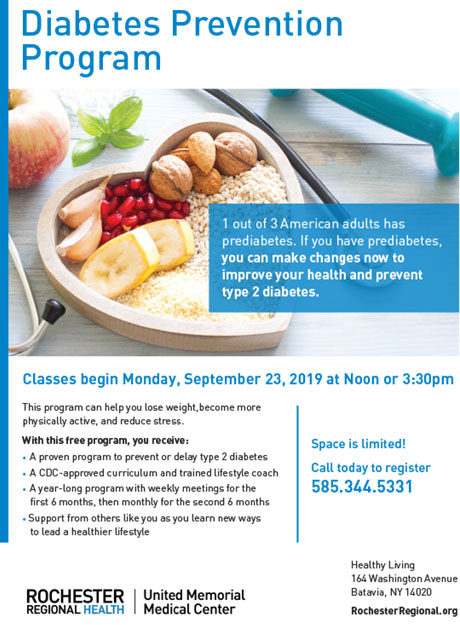GO Health reminds public about diabetes prevention
Press Release:
According to the New York State Department of Health Behavior Risk Factor Surveillance System 2021 report, Genesee County has 13.4% of adults and Orleans County has 11.4% adults diagnosed with prediabetes.
People with prediabetes — higher-than-normal blood glucose (sugar) levels — are 5 to 15 times more likely to develop type 2 diabetes than those with normal blood glucose levels. In fact, many people with prediabetes can be diagnosed with type 2 diabetes within 5 years, according to the Centers for Disease Control and Prevention (CDC).
The Genesee County Health Department has reviewed feedback from a recent survey and will be hosting the Lifestyle Change Program starting Wednesday, June 12 from 5 - 6 p.m. at the Town of Oakfield Community and Government Center, 3219 Drake Street Rd., Oakfield.
If your healthcare provider told you, you have prediabetes or are at risk of prediabetes; if you have been told you are overweight; if you have a parent, brother, or sister with type 2 diabetes; if you had gestational diabetes (diabetes during pregnancy) or given birth to a baby who weighed over 9 pounds; this program may be for you.
The Lifestyle Change Program group meets for a year — weekly for the first 6 months, then once a month for the second 6 months to maintain healthy lifestyle changes. The program’s group setting provides a supportive environment with people who are facing similar challenges and trying to make the same changes. Together participants celebrate their successes and find ways to overcome obstacles.
“One in three American adults has prediabetes, so the need for prevention has never been greater,” said Paul Pettit, Public Health Director for the Genesee and Orleans County Health Departments (GO Health). “The Lifestyle Change program offers a proven approach to preventing or delaying the onset of type 2 diabetes through modest lifestyle changes made with the support of a coach and one’s peers.”
Participants learn how to eat healthy, add physical activity to their routine, manage stress, stay motivated, and solve problems that can get in the way of healthy changes.
Now is your time to take control of your health and lower your risk of developing Type 2 diabetes. Register for the class now to claim your seat for better health: https://www.surveymonkey.com/r/GeneseeNDPP2024 , e-mail sherri.bensley@geneseeny.gov, or call 585-344-2580 x5528.
For more information on GO Health programs and services, visit GOHealthNY.org or call your respective health department at:
- Genesee County: 585-344-2580 ext. 5555
- Orleans County: 585-589-3278
Follow GO Health on Facebook, Twitter and Instagram at GOHealthNY.
Resources:

